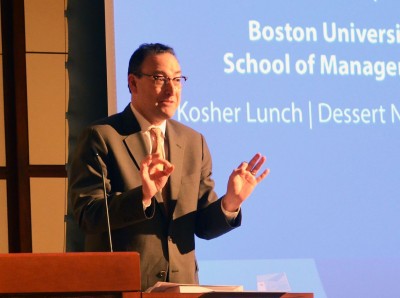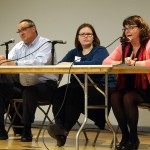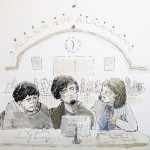
Student leaders from area schools and experts from around the United States convened Sunday at Boston University’s School of Management to learn effective strategies to combat campus anti-Semitism.
The Break the Hate Summit, hosted by The Israel Campus Roundtable and several partner organizations, featured keynote speakers, breakout discussions and networking opportunities. Approximately 100 students, experts and staff participated in the summit activities.
Matt Lebovic, the associate director of campus services at ICR partner organization Combined Jewish Philanthropies, said the conference was organized at the request of Boston students.
“The event is for local area students who approached us [at CJP] with concerns about things they’ve been seeing happening around the country in terms of anti-Semitism,” he said in an interview before Sunday’s conference. “The anti-Israel criticism is fair, just like it’s fair to criticize any country. That’s the best American value we have, but when it’s all out of proportion and when it’s demonizing … that’s not anymore criticizing Israel. That’s anti-Semitism.”
Lebovic said although there haven’t been any large-scale recent occurrences of anti-Semitism in Boston, there have been several incidents in other areas around the country and the world that are of great importance.
“Just because these things are taking place in Egypt, or Ohio, or New Jersey doesn’t mean we shouldn’t care about them,” he said. “It goes hand in hand with the anti-Jewish anti-Semitic climate.”
BU Hillel helped organize the conference and also participated in the summit from start to finish, Lebovic said.
David Danesh, a senior in SMG and a founder of one of ICR’s education programs on the Israeli investment sector, opened the conference by raising questions about the recent anti-Semitic acts in the United States.
“This year, campuses around the country and world have seen an increase in anti-Israel and anti-Semitic activities,” he said in his speech. “Why are students attacked for holding an Israeli flag? These are questions Jewish and non-Jewish students have asked from the beginning.”
Various university student governments around the country, including those at University of California, Davis and Northeastern University, have introduced measures to boycott Israel, Lebovic said. Israel boycotts at Northeastern and other schools have been the primary reason that BU Hillel students contacted the ICR.
Keynote speaker Kenneth Marcus, president and general counsel of The Louis D. Brandeis Center for Human Rights Under Law, said in his presentation there was a need to speak out against and know how to respond to hateful comments.
“You have to be ready for what you are going to do if it happens, even if it means making enemies,” he said in his presentation. “You need to be sure that you are doing the right thing for any group facing discrimination.”
Deborah Lipstadt, another keynote speaker and the Dorot Professor of Modern Jewish and Holocaust Studies at Emory University, said in her speech that there is a need for directness to deal with discrimination in any context.
“Unless you name something, you can’t solve it,” she said in her presentation. “If you don’t identify racism as racism, you can’t solve it. If you can’t identify sexism as sexism, you can’t solve it. If you don’t call religious anti-Semitism anti-Semitism, you can’t solve it.”
To address anti-Semitism, Lipstadt offered a piece of advice to aid all activists dealing with issues of free speech and discrimination.
“Never say ‘Yes, but,’” she said. “That is an attempt to rationalize it, that doesn’t make it OK. We can’t be angry. We can’t be passionate. We have to be strategic.”
Between speakers, attendees attended “breakout sessions” of their choosing with short lectures on relevant subjects, with topics ranging from “Free Speech on Campus” to items such as “Knowing Your Rights.”
Several students said they came to the summit to have conversations about anti-Semitism on college campuses.
Avital Mannis, outgoing president of Terriers for Israel, said she fears rising anti-Semitic sentiment in campus settings.
“I want to make sure that if it [anti-Semitism] does happen at Boston University, we have the tools necessary to combat it and make sure that all Jewish and Israel-supporting students feel safe,” said Mannis, a junior in BU’s College of Arts and Sciences.
Lindsey Evans, 19, a student at Northeastern, said she attended the conference hoping to find ways to articulate her feelings in a pressurized environment.
“I’m interested in Israel advocacy, and I care a lot about Israel, but I don’t really know how to express that,” she said. “Especially on my campus, which kind of has a lot of issues with that.”





First, israheili intel is running a worldwide propaganda op with
its agents running stories about “rising tide of anti semitism”. but
it is all a lie, just propaganda designed to get sympathy for the “poor
jews, i.e. zionist thugs” who are committing mass murder in gaza. Just google: rising
tide of anti semitism…………you can see the operation for yourself.
Second, see the link below for an example of the zio mafia trying to turn legitimate ciritism of israheil into a crime. under their definition saying “that sure was horrible of israheil to mass kill all those kids last summer” or “israheil killng all those kids in gaza reminded me of the warsaw ghetto” would be hate speech and therefore a crime.
,
http://www.amchainitiative.org/wp-content/uploads/2014/09/CNES-Report.pdf.
go to page 16-17 and you will see the conspiracy.
The truth does not fear investigation or need the law to uphold it.
Finally someone is talking about this issue!
When the Arab countries refuse to negotiate with Israel, because they don’t want any Jewish sovereignty in the Middle East, yes, that’s anti-Semitism. And when faculty single out only the Jewish country’s faults, but not the much worse faults of Saudi Arabia and Qatar and Yemen, yes, that’s anti-Semitism. Thank goodness people are doing something!
Truth-Heil, Aren’t you ashamed of being a racist? Racism is immoral, and the sign of a weak mind.